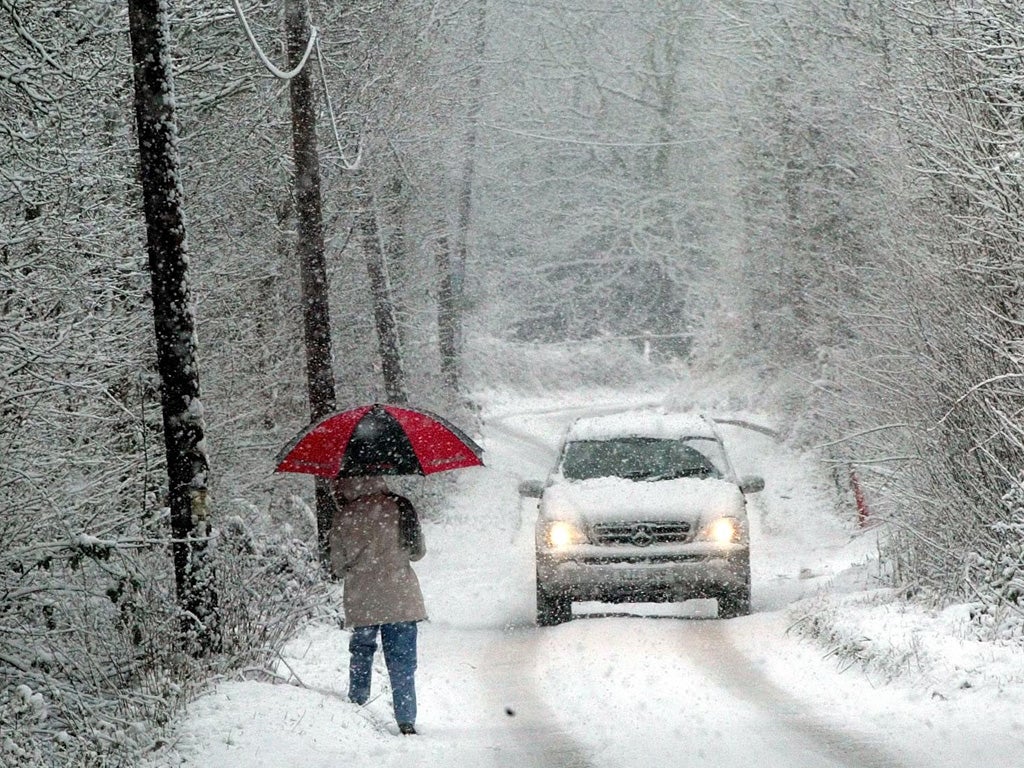There was a 29 per cent increase in deaths linked to the cold weather last winter, new figures have revealed.
According to a report by the Office for National Statistics, “excess winter deaths” in England and Wales rose by almost a third compared with the previous year, with 31,000 additional deaths.
The figures follow a bitterly cold start to the year.
This March was the coldest since 1962, with an average monthly temperature of just 2.6C (36.7F).
In March, 1,582 people died every single day - 14 per cent higher than average, the report states.
“The increased level of excess winter mortality coincided with a decrease in the average winter temperature,” the report states.
“This suggests that the higher levels of excess winter mortality in 2012/13 may be due to a particularly prolonged winter with lower than average temperatures in February and March.
“The number of deaths peaked in the first week of January, which coincided with a peak in rates of influenza-like illness over the Christmas weeks. The mean number of daily deaths was higher than average for a prolonged period between February and April 2013.”
Pensioners were worse affected by the 31,000 additional deaths, which are calculated by comparing the death rates from the non-winter months to those that occur between December and March, the ONS report states.
Over-75s accounted for 25,600 winter-related deaths.
The ONS said that women over the age of 85 had the greatest number of excess winter deaths for all age groups. Last winter, there were 28.2 per cent more deaths among women in this age group compared to the non-winter period.
Excess winter mortality for 2012/13 was highest in the North West of England and lowest in London - which bucks the trend of the previous year when the highest excess winter death rates were observed in the capital, the report adds.
There were 18,000 winter-related female deaths, a rise from 13,610 the previous year. Meanwhile, the number of excess male deaths was 13,100 - a rise from 10,590 observed in 2011/12.
Following recent price hikes from energy companies, many people may be forced to choose between “heating and eating”, Labour warned.
Shadow public health minister Luciana Berger said: “A third of these excess deaths are caused by people living in homes that are too cold. This winter, David Cameron's failure to stand up to the energy companies will leave too many people forced to choose between heating and eating. Ministers need to take urgent action and back Labour's plans to freeze energy bills.”
Age UK's charity director, Caroline Abrahams, added: “Excess winter deaths are preventable and today's figures are a damning indictment of our failure to address the scandal of cold homes in this country.
“We strongly believe that the only sustainable solution is investment to increase the energy efficiency of our housing stock so cold homes become a thing of the past. The Chancellor must take urgent action on this in next week's Autumn Statement.”
Dave Prentis, general secretary of union Unison, said: “The Government cannot cross its fingers and hope for a milder winter, it must take action now. The Big Six energy companies need reining in. Prices are rising at the same time as profits are growing.
“It's a national disgrace that elderly people are dying in this country because they are too frightened to put on their heating.”
Friends of the Earth fuel poverty campaigner Sophie Neuburg added: “Making energy efficiency a top Government priority would knock hundreds of pounds off fuel bills, create jobs and save thousands of lives every year.”
A Department of Health spokeswoman said: “This rise in deaths is concerning, but we know from a report published by Public Health England this August that increased excess deaths in 2012-13 were occurring across Europe and coincided with an unusually prolonged influenza season and late cold period.
“The NHS is well prepared for winter health issues, and this includes ensuring that people who are vulnerable to the cold are getting the help they need in the community.
“The annual flu vaccination campaign is under way and has been extended to two to three- year-olds to help prevent the spread of the virus to those who are more vulnerable. Public Health England has put in place the Cold Weather Plan, which includes simple and effective measures to help people stay healthy at home.”
The ONS report states that countries in Scandinavia and Northern Europe with bitterly cold winters tend to have low rates of excess winter mortality. Conversely, countries with very mild winter temperatures such as Spain and Portugal tend to have high winter death rates.
There are “many reasons” why countries with milder climates have such high levels of winter mortality. For example, people who live in countries with warmer winters tend to take fewer precautions against the cold and countries with milder winters also tend to have homes with poorer thermal efficiency, the report states.
While excess winter mortality is associated to low temperatures, conditions directly relating to cold, such as hypothermia, are not the main cause of excess winter deaths, the ONS said.
The majority of additional winter deaths are caused by cerebrovascular diseases, ischaemic heart disease and respiratory diseases. Previous research has concluded that low indoor temperature is associated with higher excess winter mortality from cardiovascular disease in England, the report adds.
Additionally, winter flu and also lead to higher death rates, the report states.
Additional reporting PA
Subscribe to Independent Premium to bookmark this article
Want to bookmark your favourite articles and stories to read or reference later? Start your Independent Premium subscription today.


Join our commenting forum
Join thought-provoking conversations, follow other Independent readers and see their replies